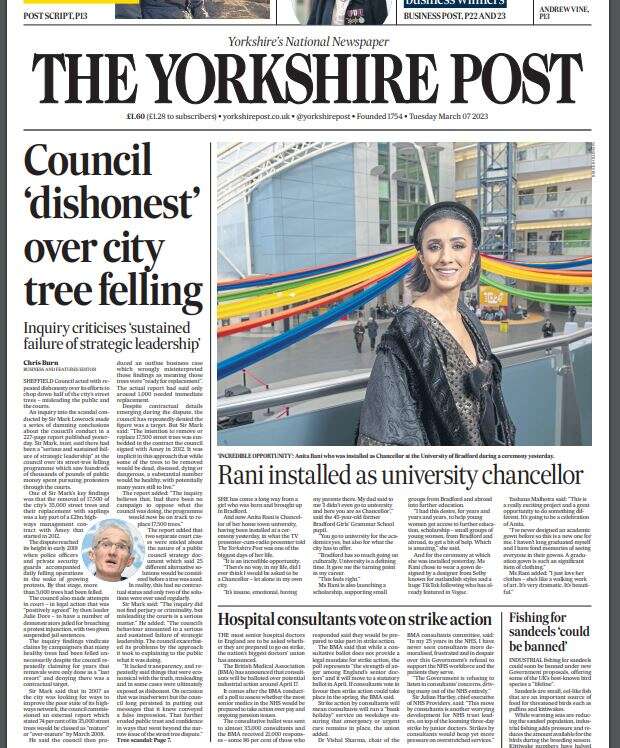Yorkshire Post reporter Chris Burn has spoken about how his credibility as a journalist was questioned by a councillor during his reporting which exposed the needless felling of thousands of trees in Sheffield.
But ultimately Sheffield Council was accused of dishonesty in a public inquiry prompted by Burn’s reporting.
Burn picked up the British Journalism Award for local reporting in December for his coverage of Sheffield Council’s felling of thousands of much-loved city trees.
He wrote dozens of stories about the issue over seven years which culminated in a public inquiry and 11,000 trees being saved.
The council ultimately issued a 2,000-word apology to campaigners, protestors, the public and the press following an inquiry. It included an acknowledgment of “serious errors of strategic leadership”.
Detailing the obstacles he experienced during his reporting, Burn explained how a local councillor questioned his credibility as a journalist.
He told Press Gazette: “There would be this narrative of ‘there’s just this one guy who’s saying all of this, it’s not accurate.’”
One story – revealing the 17,500 tree felling target – was tweeted about by a councillor and referred to as inaccurate.
Burn replied to this tweet, stressing the fair and accurate nature of the report.
The council ultimately said in its apology: “We would like in particular to apologise for repeatedly saying in the media, and in correspondence, that there was no target for the tree replacement programme, that felling was always a last resort and that any change to the tree replacement programme would result in catastrophic costs. It is clear that this was not the case.”
Burn had found the council was reluctant to offer an interview about the issue and would mainly respond through its press office.
‘Incremental reporting’ at Yorkshire Post helped scandal come to light
With support from his editor and alongside pictures by Yorkshire Post photographers, Burn’s reporting helped raise awareness of poor council practice and revealed the arrests of pensioners campaigning against the felling, which Nick Clegg, the local MP at the time, referred to as “something you’d expect to see in Putin’s Russia.”
Burn said the Sheffield tree story was an example of the sort of reporting only a local newspaper can do “because of both the detail we were able to go into about the contract, et cetera, that isn’t easy for other mediums like TV, as well as being able to cover lots of stories regularly about such a specific topic in a way that a national wouldn’t do.
“It was that incremental reporting that gradually helped bring much of the true picture to light over a number of years.”
However, he added: “You can’t pretend it’s not a tough time for local journalism. A lot of really brilliant people have left the industry over the last few years.
“We’re really lucky at the Yorkshire Post, we’re not really judged on page views, it’s about getting in subscribers, which is an incentive for good reporting.”

‘Council’s story was always shifting’ over Sheffield tree scandal
Asked about how he approached this story and his relationship with campaigners, Burn said: “I had a lot of respect and time for the campaigners, I was friendly with them, but I was not friends with them.”
He underlined the importance of not developing “tunnel-vision” when reporting, saying: “I’d like to think that if it transpired that what the council was saying was true, I would have reported it faithfully and accurately.”
He added that the ABC rule of “assume nothing, believe nobody, check everything” was at the centre of his reporting.
Burn said: “Over time, I realised that the council’s story was always shifting while the campaigners were very consistent.”
Campaigners physically blocked the trees from being cut and used Freedom of Information Act requests to collect information about the council’s decision-making process.
Burn said: “By 2018, the council were sending dozens of police officers and security guards going to these fellings because there were so many protests.
“Whatever you think of the ins and outs of it, you can tell something had gone seriously wrong.”
Burn said this showed “some institutional blindness in Sheffield Council – when the writing was clearly on the wall that this was not working as a policy, they doubled down rather than taking a step back”.
Burns reiterated his thanks for those who sent him supportive messages after he won the award and said: “A few people have said that I should write a book about the whole trees saga and winning the award has given me the confidence to consider that more seriously.”
‘Chris restored my faith in journalism’
Tree campaigner Paul Selby has said of Burn’s reporting: “My closest involvement with Chris was around revealing the 17,500-tree felling target. Long denied by Sheffield Council, my Freedom of Information request was refused, until the Information Commissioner forced the council to release the information.
“Chris worked with me to further research the story, before publishing the story in the Yorkshire Post. This story led to a cascade of national and international media interest, Chris’ story in effect being reprinted all over the world. As a result, Sheffield Council were overwhelmed with questions they could not answer. Together with violent attacks on campaigners by private security, which Chris was ensuring was brought to public attention, this led to the pause in tree felling.
“Chris has restored my faith in journalism. It was Chris’ journalist skills and his investigative detail that helped turn things round for the campaign.”
The post Yorkshire Post reporter’s credibility wrongly questioned over Sheffield tree scandal appeared first on Press Gazette.





























